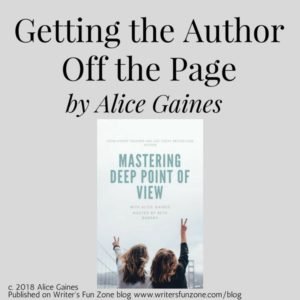Getting the Author Off the Page by Alice Gaines
 “Getting the Author Off the Page” by Alice Gaines was originally published in Writing Romance: The Ultimate Guide on Craft, Creation and Industry Connections.
“Getting the Author Off the Page” by Alice Gaines was originally published in Writing Romance: The Ultimate Guide on Craft, Creation and Industry Connections.
***
There I was, about halfway through writing my first book.
My heroine, Rory McDermott, was sitting in the coach’s booth at a minor league professional football game. She’d just suggested a play to the head coach. And, I wrote, “Down on the field, Sidewinder put on his helmet and ran into the game.”
I stopped writing and stared at the sentence.
I knew enough about writing to realize I was supposed to be showing the story through my main character’s eyes.
I wasn’t supposed to be reporting dry facts or, worse, telling Sidewinder’s story.
Still, that sentence worked. In fact, it worked far better than the alternative, “Rory watched Sidewinder put on his helmet and run into the game.”
Why?
Over the years, the revelation I had that day came to fit in a category that I call “getting the author off the page.”
Others call it deep point of view and various other things.
I love deep point of view and practice it as best I can.
Nothing else does more to make a reader love the characters or to allow her to share in the characters’ emotions.
I’ve developed some guidelines for myself, and I’ve shared them with contestants whose entries I’ve judged in contests.
They might help you, too.
Please note that these are not rules.
Rules accomplish little besides making writers uncomfortable, and we do that to ourselves without any help.
In fact, I’ll give examples of when you should violate my guidelines.
 If you spent your hard-earned money for this book, you might want to let my ideas float around in your head and see if they make sense to you.
If you spent your hard-earned money for this book, you might want to let my ideas float around in your head and see if they make sense to you.
There are three broad categories of verbs that remove us one or more steps from experiencing the character’s life directly.
They are sensing, thinking, and emoting verbs.
- Sensing: To sense, feel, hear, smell, touch, taste, and others.
- Thinking: To think, realize, imagine, wonder, ponder, muse, be puzzled or confused, and others.
- Emoting: To feel, hate, fear, mourn, or to be angry, full of rage, sad, frightened, hopeless, and others.
For example:
Your heroine is running for her life from the bad guy.
She has ducked into an alley and hidden in a doorway, hoping he’ll go by without finding her.
You could write:
“She could feel her heart pounding in her chest and hear his footsteps approaching. Fear washed over her.”
The first two are sensing verbs, and the third is a variant of an emoting verb.
This passage has the author telling (oops, that word) what’s going on inside the heroine rather than letting the reader experience it directly.
As a reader, I’d much prefer:
“Her heart thundered in her chest as his footsteps approached. Damn, this had to work. If he found her, he’d cut her to ribbons.”
A few more details of what his footsteps sound like and the gruesome way he’d kill her would probably make the passage more compelling, but I hope you catch my drift.
If done correctly, this method eliminates the reporter (the writer) and puts the reader directly in touch with the heroine.
Here’s another one we see in romance a lot:
What, she wondered, was he thinking?
We shouldn’t have to be told who’s doing the wondering.
We should know whose head we’re in.
What was he thinking?
is far more direct.
Or work in some clues to how she feels about his behavior.
What in blue blazes was the stupid man thinking?
Notice that you’ve shown that the heroine is angry because she’s cursed with blue blazes. And, you know she thinks he’s stupid or at least that he’s acting stupid now.
When you get right down to it, people often deny their emotions, especially negative ones like anger and jealousy.
This gives us a wonderful tool as writers.
The character can be obviously upset about something and refuse to admit it.
You’ve all seen this in real life. Someone scowling, wagging her foot and declaring, “I’m not mad. If he wants to make an idiot of himself in front of the entire company, that’s his business.”
And, we all know how much fun it is when the heroine refuses to face the fact that she finds the hero attractive.
We know better, and honestly, she does, too. She just won’t admit it.
Here’s one from my own writing.
“Isabel Clinton cursed her luck.”
That’s not horrid, but it’s still me telling the reader that Isabel feels she has bad luck.
Cursed luck gets the point across better.
Of course, you want to follow with the details of her accursed luck, as in,
“Cursed luck. Isabel Clinton had sat for X days on a stiff train car seat only to arrive in Oakland, California, in the middle of a heat wave. One hundred degrees, the conductor had said. It might as well be Hades.”
I must confess that I almost broke one of my nonrules here. I almost wrote, “It felt like Hades.”
People do occasionally think about their own perceptions, thoughts, and emotions.
If you visit my house in the winter, you might be tempted to say, “It feels like a refrigerator in here.”
Noncompliance with my Nonrules
So, this feels like a good place to discuss noncompliance with my nonrules.
At the beginning of a new scene, you need to clue the reader in to whose point of view they’re in.
If I were to start a scene with:
“Down on the field, Sidewinder put on his helmet and ran into the game,”
you’d have to assume this is Sidewinder’s story.
“Rory watched as” or “Rory’s stomach clenched as” would let the reader know we’re with Rory.
In the case of “What, she wondered, was he thinking?” the author might want the “she wondered” to make the rhythm of the sentence work.
Rhythm is very important in writing, especially in comedy.
I think we’ve all seen this one overdone, though, and it gets quite cloying.
You might want to use sensing, thinking, and emoting verbs for emphasis.
Suppose the husband has just denied being at the No Tell Motel the night before.
It would be perfectly logical for the wife to think, “She knew he’d been there. She’d seen his car in the parking lot.”
Finally, sometimes there’s just no other way to say something without tying yourself—and your reader—into knots.
So, how can you tell when to avoid sensing, thinking, and emoting verbs?
My suggestion is that when you find yourself writing, “She saw a plume of smoke on the horizon,” or “She knew he wasn’t telling the truth,” or “The sound terrified her,” you stop and take a look at the passage and see if there isn’t a more convincing way to create the image you’re reaching for.
It may be that “A plume of smoke appeared on the horizon,” or “Lying came naturally to him, it seemed,” or “Damn! What was that sound? Had someone broken in the back door?” will do a better job for you.
***
If you’d like to learn more about how to get the author off the page, as Alice says, and write with Deep Point of View, then join us for this special training here.
***
***
ABOUT ALICE GAINES
 USA Today bestselling author Alice Gaines writes about nice people having outrageous sex.
USA Today bestselling author Alice Gaines writes about nice people having outrageous sex.
She’s published with numerous houses, including Red Sage, Dorchester, Harlequin Spice Briefs, Carina Press, and Avon Impulse.
Her Regency romance, Captain and Countess, was one of the first ten books selected for Kindle Scout.
Over her long career, she’s won several awards and contests for her writing. She currently writes erotic contemporary romance and sizzling paranormal romance for Entangled Publishing and Changeling Press.
With a PhD in Psychology from UC Berkeley, she’s a firm believer that Deep Point of View is a powerful tool for pulling readers into your story.







Thanks for this, Alice. Your examples were very helpful.